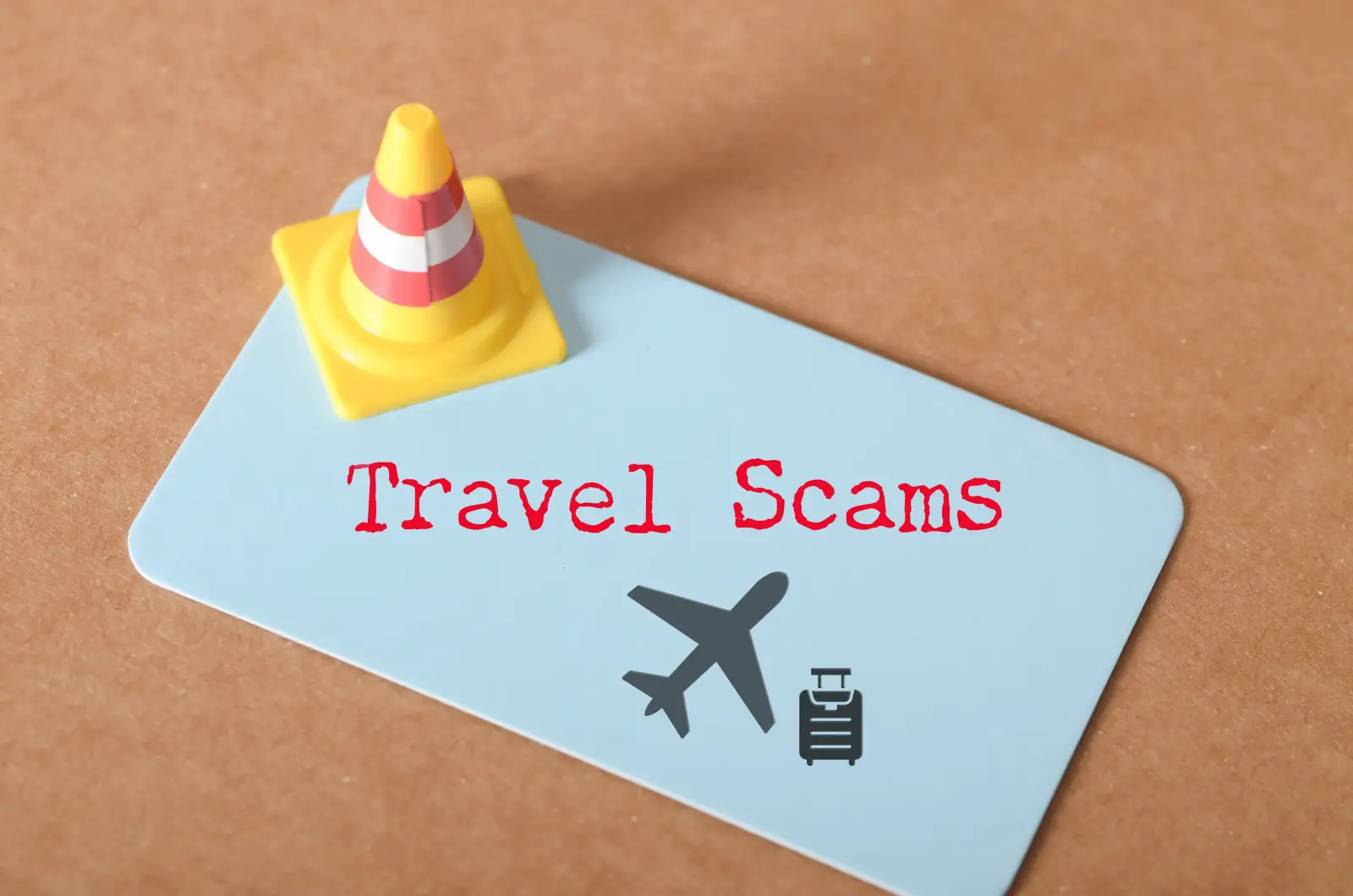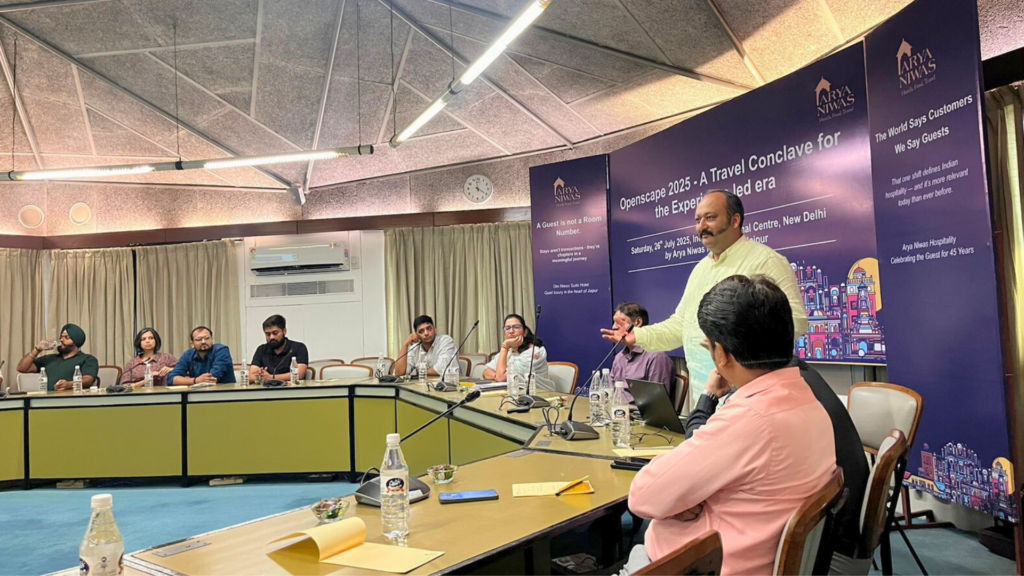AI in Travel
Global consumers fear AI-powered fraud in the travel industry

Fake AI-generated video dupes elderly couple to travel
In July, a misleading video generated through artificial intelligence (AI) promoting a non-existent cable car in Kuak Hulu in the state of Perak in Malaysia, caused an elderly couple from Kuala Lumpur to travel all the way there, only to be disappointed upon arrival to learn that it was fake.
The misleading video in question, still available on TikTok and Facebook as of press time, appears to have fooled many due to its convincing visuals and use of fabricated news-style narration.
Consumers worry travel industry being unable to protect them from AI fraud
Online mobile payment and identity verification company, Jumio, has released new findings from its 2025 Online Identity Study as digital identity protection may be taking a more prominent spot in the holiday planning process.
Nearly half of global consumers (44 per cent) lack confidence in the travel industry’s ability to protect them from AI-powered fraud, including identity theft and account takeover fraud.
Singapore has lowest level of AI-fraud concern
Interestingly, while that figure rises to 55 per cent in the United States, Singapore reported the lowest level of concern globally — only 37 per cent of consumers say they lack confidence in the industry’s fraud protections. This raises concerns that consumers in one of Asia’s busiest travel hubs may be underestimating the growing threat of AI-driven scams.
For the sharing economy (including holiday rentals and other travel-focused gig economy services), confidence falls even further, with 42 per cent in Singapore and 50 per cent globally saying they don’t feel adequately protected.
Consumers share sensitive personal data
Consumers share sensitive personal data in exchange for a simple holiday, notably turning over government-issued IDs like passports and drivers’ licenses in order to book and check into flights, reserve accommodations and rental cars, and more. This exchange of data makes consumers vulnerable to fraud during the summer travel season — and they recognise the risk.
These sentiments trend alongside broader global distrust in digital spaces, with 69 per cent of global respondents (and 74 per cent in Singapore) saying AI-powered fraud now poses a greater threat to personal security than traditional forms of identity theft.
Convenience should not be prioritised over security
In response to this distrust, consumers worldwide are slightly more willing to invest more time in identity verification on these platforms than in 2024. However, some markets — like Singapore — are showing signs of decreasing caution, potentially prioritising convenience over security:
- In 2025, 74 per cent of global consumers said they would willingly spend more time on identity verification when accessing travel and hospitality-related platforms if it improved their security — up from 71 per cent in 2024. In Singapore, the figure is even higher at 78 per cent, but this actually represents a six per cent decline from last year, signalling a possible shift toward convenience despite rising AI fraud risks.
- Global willingness to spend time verifying identity on sharing economy platforms also stayed high at 70 per cent in 2025, only slightly down from 71 per cent in 2024. In Singapore, however, the drop was steeper — falling 11 percentage points to 74 per cent, down from 85 per cent in 2024. This suggests that, despite increasing fraud sophistication, Singaporean consumers may be letting their guard down when it comes to personal security on these platforms.
Global consumers’ increasing willingness to spend time on identity verification for travel-related transactions follows a growing trend in traditionally higher-risk industries. For instance, 80 per cent of consumers globally and 82 per cent of Singapore consumers were willing to spend more time on security for digital platforms supporting banking and financial services.
“Whether it’s an evacuation plan or a safe in every hotel room, the travel and hospitality industry know how to build the structures and processes customers need to feel safe. Now customers expect the same level of care for their personal data,” explained Bala Kumar, chief product and technology officer at Jumio. “But travel and hospitality businesses can’t keep layering traditional protections on already complex processes — they need new solutions and technologies to balance convenience with protection, even as AI-powered scams evolve.”
The Jumio 2025 Online Identity Study surveyed 8,001 adult consumers evenly distributed across the United States, the United Kingdom, Singapore, and Mexico. Censuswide fielded the survey between 9 and 24 April 2025.
Photo Credit: Teacher Photo / Shutterstock.com
AI in Travel
With focus on AI, sustainable travel Arya Niwas organises Openscapes 2025 in New Delhi

The opportunities and challenges that issues like artificial intelligence, sustainability and experiential travel pose to the tourism industry in India and overseas were highlighted at Openscapes 2025, a travel conclave in New Delhi on Saturday.
Organised by Arya Niwas, a hospitality group based in Jaipur, the conclave served as a participative platform to explore transformative ideas for the tourism sector, addressing pressing issues such as sustainability, experiential curation, the role of artificial intelligence (AI), and the integration of responsible practices into the travel experience.
Drawing stakeholders from across India’s hospitality industry, the conclave was organised with the core theme of Projecting India and Rajasthan with a stronger, more meaningful narrative.
“This is the first conclave. It is called Openscapes. We hope that we will be having more such dialogue-based conclaves on travel. There is a need for us to behave as one in the travel industry and to move forward together because the ultimate aim is to serve the guests and make the guests win,” Pooja Bansal, Owner and General Manager, Arya Niwas, told India & You on the sidelines of the event.
The urgency of the issues raised at the meeting was underscored by leading tour operators, who highlighted that Indian tourism, particularly in recent years, “has not been sustainable and things have gone really, really bad.”
The conclave drew stakeholders from across India’s hospitality industry
“When we talk about sustainability with experiential tourism, the experience at the grassroot level, meeting local people with a bit of sustainability, offers eye-opening encounters. Yet, there are challenges,” Navneet Arora, Managing Director, VINString Holidays, a travel agency in New Delhi, told India & You.
The meeting illustrated both obstacles and achievements in rural and urban experiential tourism. Operators cited instances where visitors’ immersion in heritage neighbourhoods and private homes fostered mutual pride among locals and tourists. However, they also warned against approaches that leave rural residents feeling like “monkeys in the zoo,” underscoring the necessity of responsible, respectful interaction, something now addressed by ensuring a share of tour proceeds benefit the communities involved. Sustainability, participants argued, extends well beyond eco-friendly rhetoric.
The conclave highlighted innovative tour formats, slow tourism, creative workshops and direct engagement with artisans, as pathways for deeper, more rewarding guest experiences.
“I think that is the call for the future, because automation has to come in. If we are not doing automation today, we are backwards. AI is important. The event opens up eyes for a lot of people. Difficult, but yes, AI and sustainability are important and doable,” Arora added.
“The interpretation of sustainability has become very cliché. This was a session to break that,” said Bansal.
Participants at the Openscapes 2025 called for a sustained dialogue, with suggestions for sector-wide conventions and targetted sessions on marketing and AI and more collaborative initiatives.
AI in Travel
Sabre Corporation’s Strategic Partnership with Christopherson Business Travel and Its Implications for Undervalued Cloud and AI Stocks

Sabre Corporation (NASDAQ: SABR) has long been a cornerstone of the global travel technology sector, but its recent strategic partnership with Christopherson Business Travel marks a pivotal evolution. By leveraging its AI-driven platform and cloud-native infrastructure, Sabre is not only modernizing corporate travel management but also positioning itself as a catalyst for growth in the undervalued travel tech sector. For investors, this collaboration offers a compelling case study in how AI and cloud innovation can unlock long-term value in a niche yet resilient market.
A Strategic Alliance for the Future of Corporate Travel
On July 17, 2025, Sabre announced a multi-year agreement to become Christopherson Business Travel’s primary technology partner. This partnership is more than a transactional arrangement—it’s a strategic alignment of two companies aiming to redefine corporate travel through automation, real-time data, and personalized service. Sabre’s AI-powered tools, including Sabre Red 360, Trip Proposal, and Market Intelligence, will streamline operations for Christopherson, enabling faster decision-making and enhanced client offerings.
The integration of Sabre’s cloud-native infrastructure into Christopherson’s proprietary Andavo platform is particularly noteworthy. This move allows for real-time orchestration of multi-source content (air, hotel, rail, ground) and seamless API-driven integrations, reducing manual effort and improving scalability. As Chad Maughan, CTO of Christopherson, noted, Sabre’s architecture provides the operational flexibility needed to adapt to evolving client demands—a critical advantage in the post-pandemic corporate travel landscape.
Sabre’s Financial Resilience and AI-Driven Growth
Sabre’s financial performance in 2024 underscores its transition from a turnaround story to a growth-oriented entity. Revenue increased to $3 billion, with adjusted EBITDA rising to $517 million—a 54% year-over-year improvement. While IT Solutions revenue dipped due to de-migrations, the Travel Solutions and Distribution segments grew by 4% and 6%, respectively, driven by demand for Sabre’s AI-powered tools.
The company’s market cap of $1.222 billion pales in comparison to AI/cloud giants like Databricks ($62 billion) or Snowflake ($43.6 billion), but this undervaluation reflects Sabre’s niche focus. Its strategic investments in Sabre Mosaic—a modular platform combining AI, cloud, and traditional agent workflows—position it to capture a larger share of the corporate travel market, which is projected to grow as businesses prioritize cost optimization and efficiency.
The AI/Cloud Travel Tech Opportunity
The broader travel tech sector is undergoing a transformation fueled by generative AI. According to Skift Research, AI-driven tools could create a $28 billion+ opportunity for the industry, with applications in personalized itineraries, dynamic pricing, and automated customer service. Sabre’s Automated Exchanges & Refunds and Agency Retailer solutions are already streamlining post-booking processes, reducing manual intervention by up to 70%.
However, Sabre is not alone in the race to monetize AI in travel. Competitors like C3.ai (NYSE: AI), Marvell Technology (NASDAQ: MRVL), and DigitalOcean (DOCN) are also leveraging cloud and AI to drive growth. C3.ai’s predictive analytics tools, for instance, have secured government contracts worth $450 million, while Marvell’s AI-optimized chips are powering data centers for hyperscale providers. Yet, Sabre’s deep vertical integration into travel-specific workflows gives it a unique edge in the corporate travel niche.
Why Sabre Is an Undervalued Investment
Despite its strategic advantages, Sabre remains overlooked by many investors. Its current price-to-earnings ratio (P/E) of 8.5 is significantly lower than the industry average of 18.5, and its hedge fund ownership (11.2%) suggests growing confidence in its AI-driven roadmap. The partnership with Christopherson is a validation of Sabre’s value proposition: it enables the company to scale its AI/Cloud offerings without overhauling existing systems, a critical factor for travel agencies seeking cost-effective modernization.
For investors, the key question is whether Sabre can replicate its success in other verticals. The company’s PowerSuite Cloud platform, which automates operations and integrates NDC content, is already gaining traction among mid-sized travel agencies. If Sabre can expand its footprint in the corporate and leisure travel markets, its revenue could outpace the 10% growth projected by analysts.
Conclusion: A Strategic Bet on AI-Driven Travel
Sabre’s partnership with Christopherson Business Travel is a microcosm of the broader shift toward AI and cloud-native solutions in travel technology. While the company may lack the valuation of tech giants like Microsoft or Google, its focus on vertical-specific innovation and operational efficiency makes it a compelling play for investors seeking exposure to the travel sector’s AI revolution.
For those considering a diversified portfolio, Sabre offers a unique blend of undervaluation and growth potential. However, it should be viewed as a complementary holding to broader AI/cloud stocks like C3.ai or Marvell, rather than a standalone bet. As the travel industry continues to embrace AI-driven automation, Sabre’s ability to deliver scalable, client-centric solutions will likely drive long-term value for both its partners and shareholders.
AI in Travel
AI Travel Tricks: Watch Out for the Road to Nowhere – Herald/Review Media

AI Travel Tricks: Watch Out for the Road to Nowhere Herald/Review Media
Source link
-

 Brand Stories6 days ago
Brand Stories6 days agoBloom Hotels: A Modern Vision of Hospitality Redefining Travel
-

 Brand Stories23 hours ago
Brand Stories23 hours agoCheQin.ai sets a new standard for hotel booking with its AI capabilities: empowering travellers to bargain, choose the best, and book with clarity.
-

 Destinations & Things To Do7 days ago
Destinations & Things To Do7 days agoUntouched Destinations: Stunning Hidden Gems You Must Visit
-

 AI in Travel7 days ago
AI in Travel7 days agoAI Travel Revolution: Must-Have Guide to the Best Experience
-

 Brand Stories3 weeks ago
Brand Stories3 weeks agoVoice AI Startup ElevenLabs Plans to Add Hubs Around the World
-

 Brand Stories2 weeks ago
Brand Stories2 weeks agoHow Elon Musk’s rogue Grok chatbot became a cautionary AI tale
-

 Asia Travel Pulse3 weeks ago
Asia Travel Pulse3 weeks agoLooking For Adventure In Asia? Here Are 7 Epic Destinations You Need To Experience At Least Once – Zee News
-

 Destinations & Things To Do19 hours ago
Destinations & Things To Do19 hours agoThis Hidden Beach in India Glows at Night-But Only in One Secret Season
-

 AI in Travel3 weeks ago
AI in Travel3 weeks ago‘Will AI take my job?’ A trip to a Beijing fortune-telling bar to see what lies ahead | China
-

 Brand Stories3 weeks ago
Brand Stories3 weeks agoChatGPT — the last of the great romantics

You must be logged in to post a comment Login